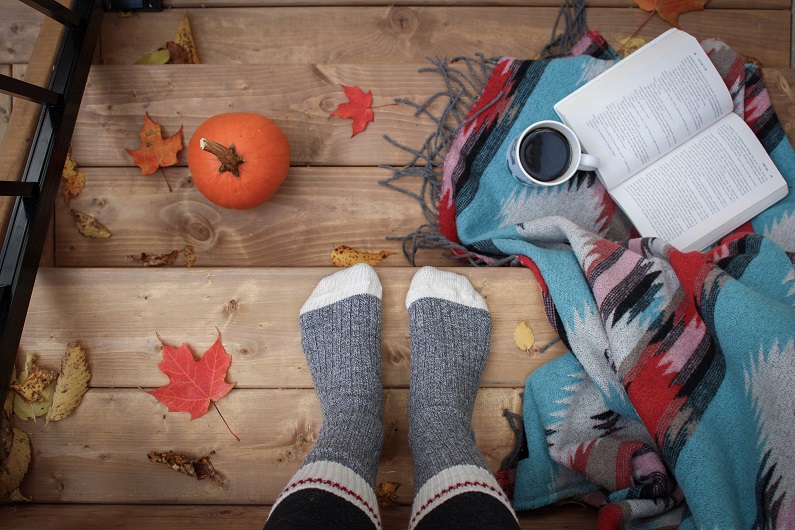The following article on autumn anxiety and HSPs was originally written for Highly Sensitive Refuge under the title “For Highly Sensitive People, Autumn Anxiety Is Real”.
Do you experience anxiety when fall sweeps in? If your mood and energy suddenly feel off balance at this time of year, you’re not alone.
As a highly sensitive person (HSP), I’ve known this feeling since childhood. It’s the anticipation that arrives when the vibrant glow of summer wanes and crisp air whispers that change is imminent.
Perhaps you dislike the inevitable shorter days and colder weather. Maybe you simply have an unsettled feeling that arises from associations, memories, and existential anxiety that can’t quite be expressed through words.
If you can relate, you know the very real feeling of autumn anxiety.
Why HSPs May Feel Autumn Anxiety
While autumn anxiety is not an official mental health diagnosis, anxiety in fall is common. Some clinicians suggest anxiety may be triggered by dwindling sunlight and heightened for those anticipating change, Seasonal Affective Disorder, or upcoming holiday anniversaries.
Although anyone can experience autumn anxiety — highly sensitive or not — it’s likely that HSPs are more susceptible to it. Therapist Gillian Scully, who coined the term, has said, “It seems that people who are already quite sensitive and aware of their surroundings have been experiencing these feelings.”
Highly sensitive people are keenly aware of environmental subtleties and feel nostalgic memories deeply. It’s understandable why your nervous system may feel destabilized during seasonal change.
There’s also another way to understand the seasonal change.
Autumn Anxiety from a Yogic and Ayurvedic Lens
As a yoga teacher, I find it important to consider some of the basic principles of Ayurveda, yoga’s “sister science” for understanding health, that I’ve learned from my teachers. Anyone can benefit from simply aligning more with the seasons and nature to restore and nourish well-bring, but I find this is especially true for my highly sensitive students.
Ayurveda conceptualizes that all living beings have specific constitutions or doshas (vata, kapha, pitta) that correspond to the elements (water, fire, earth, air, and ether). The unique makeup of these within each person defines their physical, emotional, and mental characteristics and lifestyle recommendations in order to bring the doshas into balance.
Likewise, the seasons of the year are also governed by doshas and autumn is known as “vata season.” This means that the vata constitution, which corresponds to the elements of air and ether is dominant at this time of year. Autumn is associated with qualities such as windy, dry, cool, unstable, and variable.
While this perspective says that vata is dominant for everyone in fall, you can imagine how you might be affected as a highly sensitive person with a system that is constantly processing, managing overload, and perhaps experiencing variable emotions.
To bring the doshas into balance, the other elements are to be harnessed. Thus, this is a time of year for grounding, gentle warming, and stabilizing.
Even if you don’t subscribe to these teachings, you can still see how a person’s mood and mindset can be strongly affected by the natural and social changes of the seasons, and how these principles can be helpful while navigating those changes.
9 Yogic and Ayurvedic Tips to Ease Autumn Anxiety
1. Align with the season.
If you tend to get sucked into longing for warmer days or dreading frigid temperatures, draw yourself into the present time of where you are now in this seasonal cycle. This is a time to reflect upon what you’ve sown and grown and harvest and savor the nourishment. It may be a time of releasing and letting go. By integrating your inner system with your outer environment, you’ll be more able to trust in the cycles of dissolution and renewal and less fixated on your likes and dislikes.
2. Make time for daily ritual.
If you consider that this is a season of change and variability, it’s obvious that some sense of routine can help to stabilize autumn anxiety for HSPs. Yet, while highly sensitive people may benefit from routine, if you’re like me, you may not dig it. That’s completely okay. One of the ways I appease this part of me that dislikes routine is to allow for variety and exploration within routine. For example, you might set aside a regular time for a yoga practice, but listen to the seasons of your body to determine what sort of breath and movement practice would be beneficial. One of my students takes morning walks and noted that she changes the route a little each time to maintain interest.
3. Create a sensitive sanctuary.
While not everyone has the privilege of expansive space or freedom from neighbor noise, you may still have a space in your home that you can dedicate as a sacred corner for your ritual practice. Maybe it is also the place where you go to be with your emotions. Keep it simple but feel free to be creative. Cozy blankets, noise cancelling headphones, candles, and special mementos can all help facilitate a feeling of enjoying the process of turning inward…where your home, body, and mind are places you want to be.
4. Sync with sunlight.
Aligning with the day and night cycles is just as important to your system as the cycles of the seasons. You may not be an early bird and I’m certainly not suggesting to go to sleep at 6 p.m. Yet, it’s important to sync with those morning daylight hours and your circadian rhythm as much as possible. Rather than setting an early alarm, you might start going to sleep a little bit earlier each night so you’re more naturally able to wake up early.
5. Restore with grounding yoga practices.
You know that yoga can support you in focusing and settling your senses. This is a good time for slow and steady yoga that integrates mildly warming practices that facilitate stability and grounding. You might focus on poses that center you in your feet and legs or restorative practices that allow you to feel your body nestling into the ground. This is also the season for turning inward with calming pranayama or meditation practice. Yoga nidra (yogic sleep) is also a wonderful way to relax and replenish.
6. Eat and cook with the season.
Consider the local foods in your region that you can integrate into your cooking and diet. Nature does a wonderful job of supplying the nutrients you need in a given time of year. Overall, this is the time to opt for warm, cooked, grounding, and seasonal foods (squash, hearty greens, sweet potatoes, apples, brussel sprouts, nuts, oils, mild spices, etc.) and really engage your senses mindfully in the process of cooking and preparing them. Here is one of my favorite fall recipes that aligns with Ayurvedic principles.
7. Stay connected.
Though autumn is a time of harvesting and turning in, this doesn’t equate to isolation. Autumn is a vital time to balance inward-oriented practices and activities with healthy community connection. You might consider seasonal activities with loved ones you can safely partake in during the pandemic: socially distanced outdoor activities like visiting an orchard or building a campfire. You may explore ways to connect with other HSPs like you.
8. Explore creativity and curiosity.
There was a time in my life when I despised winter, so I didn’t care for autumn since it leads to winter. It wasn’t until my mid-twenties that I made a commitment to spend time outdoors doing activities I love such as hiking, even in cold weather. Consider how you might awaken curiosity and explore the most mundane aspects of your surroundings, even when it’s gloomy. Perhaps there’s a new hobby to try out or an old childhood pastime to reignite.
9. Show yourself compassion.
There may be moments when not every part of you is fully available to practice and engage with the tips above, and that’s okay too. In those moments, whether life feels heavy or you feel like a frenetic mess, give yourself a break. Be loving and compassionate to those parts of yourself too, just as you would to a friend going through a tough time.
When anxiety comes with seasonal changes, it can be helpful to remember the simple truth that seasons do indeed cycle. Summer will come again, emotions will shift, and you’ll always get through it.
Over to you…
If you struggle from autumn anxiety, what helps you cope and enjoy the season more?


Seeking Meaningful Travel Without the Overwhelm?
Success! Look for my welcome email in your inbox. If you don't see it, check your SPAM!